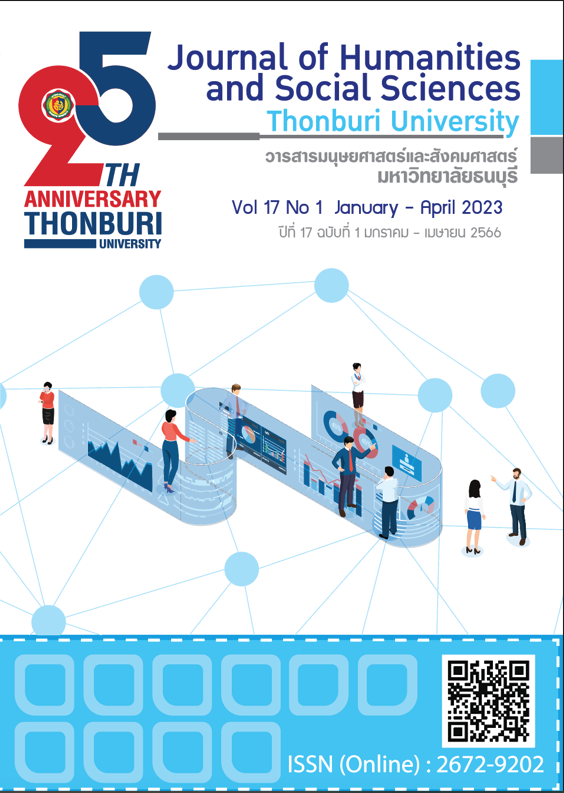แนวทางการพัฒนากรุงเทพมหานครสู่เมืองแห่งการเรียนรู้ที่เหมาะสมกับทุกช่วงวัย
คำสำคัญ:
กรุงเทพมหานคร, เมืองแห่งการเรียนรู้, เจเนอเรชั่นบทคัดย่อ
บทความวิจัยนี้มีวัตถุประสงค์เพื่อเปรียบเทียบทัศนคติเกี่ยวกับคุณลักษณะเมืองแห่งการเรียนรู้ของประชาชนแต่ละช่วงวัยในพื้นที่กรุงเทพมหานคร และสังเคราะห์แนวทางการพัฒนากรุงเทพมหานครสู่เมืองแห่งการเรียนรู้ที่เหมาะสมกับทุกช่วงวัย การวิจัยเชิงปริมาณนี้ใช้แบบสอบถามในการเก็บข้อมูลจากกลุ่มตัวอย่าง ได้แก่ ประชาชนที่อาศัยอยู่ในกรุงเทพมหานคร 4 เจเนอเรชั่น จำนวนรวม 400 คน วิเคราะห์ข้อมูลโดยใช้สถิติพรรณนา ได้แก่ ค่าเฉลี่ย ร้อยละ และการวิเคราะห์ความแปรปรวนแบบทางเดียว (One-Way ANOVA) เพื่อเปรียบเทียบทัศนคติเกี่ยวกับคุณลักษณะสำคัญเมืองแห่งการเรียนรู้ของประชาชนแต่ละช่วงวัยในพื้นที่กรุงเทพมหานคร ผลการวิเคราะห์ One-Way ANOVA ถูกพิจารณาร่วมกับคะแนนเฉลี่ยทัศนคติเพื่อสังเคราะห์แนวทางการพัฒนากรุงเทพมหานครสู่เมืองแห่งการเรียนรู้ที่เหมาะสมกับทุกช่วงวัย ผลการศึกษาพบว่า 1) ด้านประโยชน์ในวงกว้างของเมืองแห่งการเรียนรู้ สิ่งที่ควรดำเนินการก่อนคือ การพัฒนาศักยภาพและความร่วมมือทางสังคมของเบบี้บูมเมอร์และเจเนอเรชั่น X และการส่งเสริมด้านเทคโนโลยีและกลไลสนับสนุนการทำงานเป็นทีมของเจเนอเรชั่น Y 2) ด้านองค์ประกอบที่นำไปสู่เมืองแห่งการเรียนรู้ สิ่งที่ควรดำเนินการก่อนคือ การส่งเสริมการเรียนรู้ในครอบครัวหรือชุมชน และพัฒนาระบบการเชิดชูเกียรติและการให้รางวัลแก่การเรียนรู้ทุกรูปแบบแก่เบบี้บูมเมอร์และเจเนอเรชั่น X 3) ด้านเงื่อนไขสำคัญในการสร้างเมืองแห่งการเรียนรู้ สิ่งที่ควรดำเนินการก่อนคือ ผู้บริหารมีนโยบายและยุทธศาสตร์การส่งเสริมบทบาท การมีส่วนร่วม และการสร้างกลไกการพัฒนาระบบธรรมาภิบาล รวมทั้งจัดสรรงบประมาณและสิ่งอำนวยความสะดวกเพื่อสนับสนุนการเรียนรู้ตลอดชีวิตของเบบี้บูมเมอร์และเจเนอเรชั่น Y
เอกสารอ้างอิง
รศรินทร์ เกรย์, อุมาภรณ์ ภัทรวาณิชย์, อักษราภัค หลักทอง, และเจตพล แสงกล้า. (2559). คุณภาพชีวิตต่างวัยของผู้มีงานทำ. นครปฐม: สถาบันวิจัยประชากรและสังคม มหาวิทยาลัยมหิดล.
สุวิธิดา จรุงเกียรติกุล. (2561). แนวทางการจัดศึกษาตลอดชีวิตเพื่อขับเคลื่อนชุมชนการเรียนรู้ ในบริบทสังคมและวัฒนธรรมของประเทศไทย. วารสารศึกษาศาสตร์ จุฬาลงกรณ์มหาวิทยาลัย. 46(2), 218-239.
Aksakal, N. (2015). Theoretical view to the approach of the edutainment. Procedia-Social and Behavioral Sciences, 186, 1232–1239.
Andersen, K., Ohme, J., Bjarnøe, C., Bordacconi, M. J., Albæk, E., & De Vreese, C. H. (2021). Generational gaps in political media use and civic engagement: from baby boomers to generation Z. Oxford: Routledge London and New York.
Chicca, J., & Shellenbarger, T. (2018). Connecting with generation Z: Approaches in nursing education. Teaching and Learning in Nursing, 13(3), 180-184.
CISCO. (2010). The learning society. San Jose, CA: CISCO Public Information.
Daggol, G. D. (2017). Lifelong learning: not a 21st century, but an omnitemporal skill. International Journal of Social Humanities Sciences Research (JSHSR), 4(12), 1254-1267.
Dida, S., Hafiar, H., Kadiyono, A. L., & Lukman, S. (2021). Gender, education, and digital generations as determinants of attitudes toward health information for health workers in West Java, Indonesia. Heliyon, 7(1), e05916.
Dolot, A. (2018). The characteristics of generation Z. E-mentor, 74(2), 44-50.
Estebsari, F., Dastoorpoor, M., Khalifehkandi, Z. R., Nouri, A., Mostafaei, D., Hosseini, M., Esmaeili, R., & Aghababaeian, H. (2020). The concept of successful aging: a review article. Current aging science, 13(1), 4-10.
Lynott, J., Harrell, R., Guzman, S., & Gudzinas, B. (2018). The livability index 2018: Transforming communities for all ages. AARP Public Policy Institute.
Slagsvold, B., & Hansen, T. (2021). The baby-boomer generation: Another breed of elderly people? In Generational Tensions and Solidarity Within Advanced Welfare States. (pp. 153-172). Routledge.
UNESCO Institute for Lifelong Learning. (2015). UNESCO global network of learning cities: Guiding documents. Hamburg: UNESCO Institute for Lifelong Learning.
Yamane, Taro. (1967). Statistics, an introductory analysis. 2nd Edition. New York: Harper and Row.
Zhang, X., Warner, M. E., & Firestone, S. (2020). Overcoming barriers to livability for all ages: Inclusivity is the key. Urban Planning, 4(2), 31-42.
Translated Thai References
Charungkaittikul, S. (2018). Guidelines for lifelong education management to mobilize learning community in the social-cultural context of Thailand. Journal of Education Studies. 46(2), 218-239. (in Thai)
Gray, Rossarin, Pattaravanich, Umaporn, Lucktong, Aksarapak, & Sangkla. Jettapon. (2016). Quality of life among employed population by generations. Nakon Phatom: Institute for Population and Social Research, Mahidol University. (in Thai)
ดาวน์โหลด
เผยแพร่แล้ว
รูปแบบการอ้างอิง
ฉบับ
ประเภทบทความ
สัญญาอนุญาต
ลิขสิทธิ์ (c) 2022 Sornpravate Krajangkantamatr

อนุญาตภายใต้เงื่อนไข Creative Commons Attribution-NonCommercial-NoDerivatives 4.0 International License.
ผลงานที่ปรากฎในวารสารฉบับนี้เป็นลิขสิทธิ์เฉพาะส่วนบุคคลของผู้เขียนซึ่งต้องรับผิดชอบต่อผลทาง กฎหมายที่อาจเกิดขึ้นได้และไม่มีผลต่อกองบรรณาธิการ






